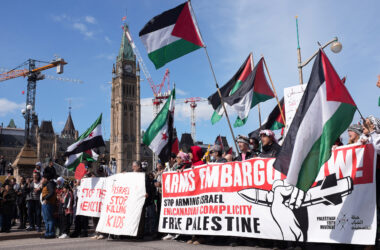On Wednesday, April 4, the McGill administration hosted the last of four public meetings of dean of arts Christopher Manfredi’s Open Forum on Freedom of Expression and Peaceful Assembly.
The meeting focused on the administration’s actions in response to the events of Nov. 10. It was held in the Bellini Atrium of the Life Sciences Complex, where students, faculty, and staff voiced their opinions on the issue.
“The purpose of these open fora is to provide members of the university community [with] an opportunity to express their views on these important subjects,” Manfredi, who led the discussion, said. “Students, faculty, non-academic staff, and senior administrative personnel have all attended the forum, participated, listened, and heard the differing views that people have put forward.”
Discussion focused on how to define the right to peaceful assembly, and whether or not the administration’s response to student mobilization had been too drastic, and what measures ought to be taken both by politically active students as well as the faculty and staff of McGill.
“The conversation has focused around four sets of issues that dean [of law, Daniel] Jutras identified in his report coming out of the events of Nov. 10, which are mainly issues of identity, location, duration, and … what might constitute justifiable limits on expression and peaceful assembly on a university campus,” Manfredi said.
The topic of whether or not recent student actions qualify as actions of peaceful assembly and what the definition of ‘peaceful’ is came up frequently, as it has been complicated by recent disruptions of university work like the occupation of the sixth floor of the James Administration Building in February.
Participants identified that those whom the protests targeted may have felt threatened or unsafe, even if the protesters themselves had no intention of being violent or threatening.
“I think the question should be shifted to: [what] is the perception by the people who are in the same room or in the same space as protesters?” Jeffrey Sachs, PhD in Islamic studies, said. “When is it reasonable for them to feel that they are in danger or are threatened? The perception question [seems to be more important] than whether or not the people intend to be violent or whether they are acting in a violent fashion.”
Ideas of perception played a role throughout the forum, as it is difficult to adopt a definition of ‘peaceful assembly’ that takes into account what all parties believe to be a disturbance of peace.
Matters of space were equally important. Some university spaces are public places where students can, in theory, legitimately engage in protests if they so desire. However, there was no consensus about the legitimacy of occupying private spaces such as offices or libraries, which, while non violent, disrupt work done in the university.
“Where it happens changes everything, so I agree with the statement that trying to pinpidgeon [sic] [all of these points] into the code is going to be very difficult,” Adam Bouchard, graduate student in the faculty of science, said. “What we really need is a way to be able to take a general [definition] of peaceful and then be able to review it either during or after the fact so that everyone can be treated appropriately.”
The meeting was the last of a series of four that constitute the Open Forum, which will formally conclude with an academic symposium on May 2 at the McGill Faculty Club. At the symposium, academics and experts will bring outside perspectives to the issues surrounding strikes and peaceful assembly that have been relevant this year at McGill.







